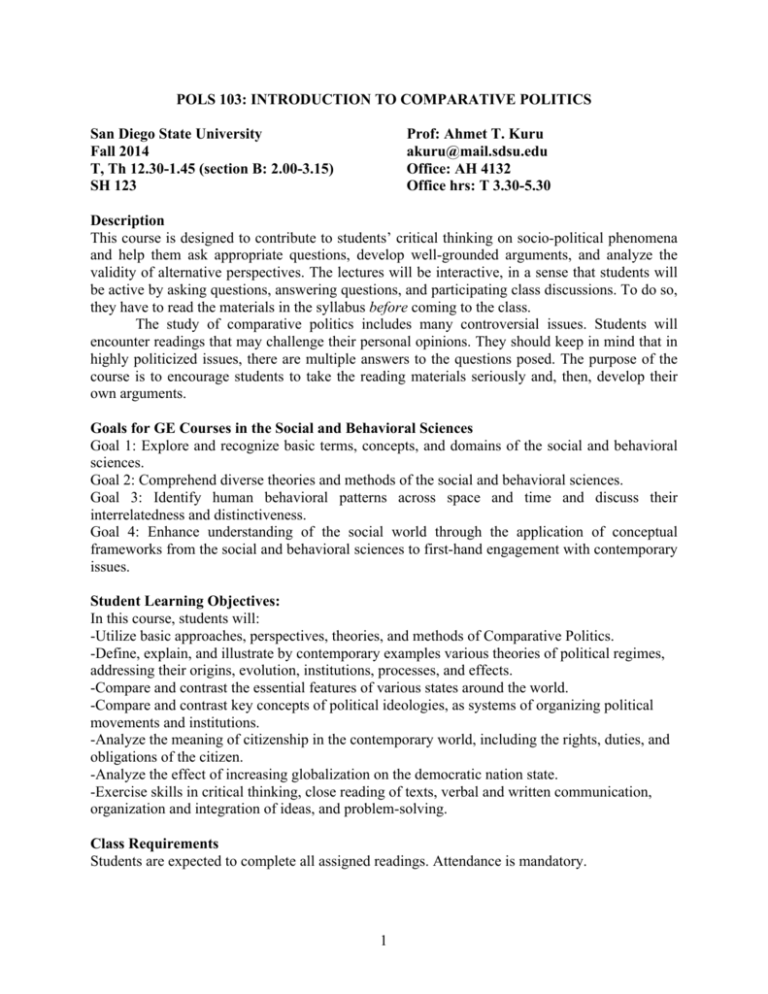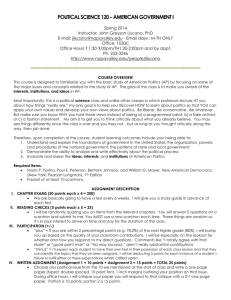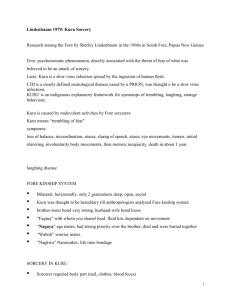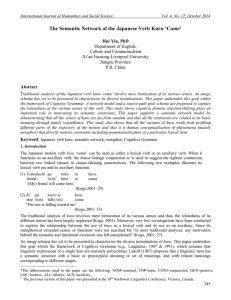1 POLS 103: INTRODUCTION TO COMPARATIVE POLITICS San
advertisement

POLS 103: INTRODUCTION TO COMPARATIVE POLITICS San Diego State University Fall 2014 T, Th 12.30-1.45 (section B: 2.00-3.15) SH 123 Prof: Ahmet T. Kuru akuru@mail.sdsu.edu Office: AH 4132 Office hrs: T 3.30-5.30 Description This course is designed to contribute to students’ critical thinking on socio-political phenomena and help them ask appropriate questions, develop well-grounded arguments, and analyze the validity of alternative perspectives. The lectures will be interactive, in a sense that students will be active by asking questions, answering questions, and participating class discussions. To do so, they have to read the materials in the syllabus before coming to the class. The study of comparative politics includes many controversial issues. Students will encounter readings that may challenge their personal opinions. They should keep in mind that in highly politicized issues, there are multiple answers to the questions posed. The purpose of the course is to encourage students to take the reading materials seriously and, then, develop their own arguments. Goals for GE Courses in the Social and Behavioral Sciences Goal 1: Explore and recognize basic terms, concepts, and domains of the social and behavioral sciences. Goal 2: Comprehend diverse theories and methods of the social and behavioral sciences. Goal 3: Identify human behavioral patterns across space and time and discuss their interrelatedness and distinctiveness. Goal 4: Enhance understanding of the social world through the application of conceptual frameworks from the social and behavioral sciences to first-hand engagement with contemporary issues. Student Learning Objectives: In this course, students will: -Utilize basic approaches, perspectives, theories, and methods of Comparative Politics. -Define, explain, and illustrate by contemporary examples various theories of political regimes, addressing their origins, evolution, institutions, processes, and effects. -Compare and contrast the essential features of various states around the world. -Compare and contrast key concepts of political ideologies, as systems of organizing political movements and institutions. -Analyze the meaning of citizenship in the contemporary world, including the rights, duties, and obligations of the citizen. -Analyze the effect of increasing globalization on the democratic nation state. -Exercise skills in critical thinking, close reading of texts, verbal and written communication, organization and integration of ideas, and problem-solving. Class Requirements Students are expected to complete all assigned readings. Attendance is mandatory. 1 Required Readings J. Tyler Dickovick and Jonathan Eastwood, Comparative Politics: Integrating Theories, Methods, and Cases. Oxford: Oxford University Press, 2012. Jeffrey Kopstein, Mark Lichbach, and Stephen E. Hanson, eds., Comparative Politics: Interests, Identities, and Institutions in a Changing Global Order. New York: Cambridge University Press, 2014. Grading Class Participation (including quizzes and assignments): 25 % Midterm Exam: 35 % Final Exam: 40 % A = 4.0 A- = 3.7 B+ = 3.3 B = 3.0 B- = 2.7 C+ = 2.3 C = 2.0 C- = 1.7 D+ = 1.3 D = 1.0 D- = 0.7 F=0 Disability Accommodation If you are a student with a disability and believe you will need accommodations for this class, it is your responsibility to contact Student Disability Services at (619) 594-6473. To avoid any delay in the receipt of your accommodations, you should contact Student Disability Services as soon as possible. Please note that accommodations are not retroactive, and that accommodations based upon disability cannot be provided until you have presented your instructor with an accommodation letter from Student Disability Services. Your cooperation is appreciated. Academic Dishonesty Students caught engaging in cheating will receive an automatic F and will be reported. SCHEDULE August 26 Introduction Dickovick Chapter 1 August 28 The Modern State Dickovick Chapter 3 September 2 Economic Development Dickovick Chapter 4 September 4 Democracy Dickovick Chapter 5 September 9 Authoritarianism Dickovick Chapter 6 2 September 11 Constitutions Dickovick Chapter 7 September 16 Legislatures Dickovick Chapter 8 September 18 Executives Dickovick Chapter 9 September 23 Political Parties Dickovick Chapter 10 September 25 Revolutions Dickovick Chapter 11 September 30 Nationalism Dickovick Chapter 12 October 2 Race, Ethnicity, and Gender Dickovick Chapter 13 October 7; Ideology and Religion Dickovick Chapter 14 October 9 MIDTERM EXAM October 14 Studying Comparative Cases Kopstein Chapter 1 October 16 Interests, Identities, and Institutions Kopstein Chapter 2 October 21 Britain Kopstein Chapter 3 October 23 France Kopstein Chapter 4 October 28 Germany Kopstein Chapter 5 October 30 Japan Kopstein Chapter 6 November 4 Russia Kopstein Chapter 7 3 November 6 China Kopstein Chapter 8 November 11: No Class (Veterans Day) November 13 Mexico Kopstein Chapter 9 November 18 India Kopstein Chapter 10 November 20 Iran Kopstein Chapter 11 November 25 Turkey Kuru, “Assertive Secularism, Islam, and Democracy in Turkey,” in Kenny and Moosa, eds., Islam in the Modern World (BlackBoard). November 27: No Class (Thanksgiving) December 2: Islam, Violence, and Authoritarianism Kuru, “Authoritarianism and Democracy in Muslim Countries: Rentier States and Regional Diffusion,” Political Science Quarterly 129, 3 (BlackBoard). December 4 Nigeria Chapter 14 December 9 European Union Kopstein Chapter 13 FINAL EXAM: Th, December 11, 10.30-12.30 (Section B: T, December 16, 13.00-15.00). 4










